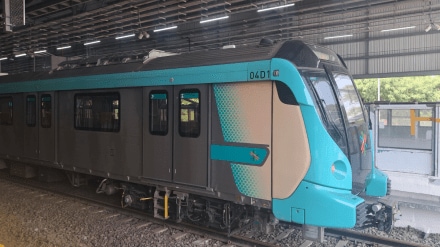Weeks after the inauguration of Mumbai Metro Line 3 (Colaba–Bandra–SEEPZ), commuters are still facing poor or no mobile network connectivity in the underground stretches, reported The Indian Express.
The issue has left passengers frustrated, even though the infrastructure to provide coverage is already in place.
Dispute Over Third-Party Infrastructure Delays Full Connectivity
The problem is largely commercial. The Mumbai Metro Rail Corporation Limited (MMRCL) awarded ACES India Private Limited the contract to provide In-Building Solutions (IBS) at stations and tunnels. However, telecom operators Jio, Airtel, and Vodafone Idea (Vi) have said the charges set by ACES are commercially unviable.
In February, the operators offered to connect to ACES’s network free-of-cost until a deal is finalized, with payments to begin later. Yet, disagreements persist. While Vi and BSNL are gradually providing services, Jio has refused, citing high charges and proposing to install its own network.
When asked about connectivity issues, a MMRC official told The Indian Express, “The contract to lay and provide Neutral infrastructure (IBS) that can be used by all telecom entities was given to a third party who has the licence from DoT [Department of Telecommunications] to provide such services.”
The official added, “The contractor has laid the IBS network of international standards to provide 95 per cent coverage. Vodafone Idea (Vi) and Airtel have connected to a few Metro stations using this infrastructure, and their network were working. However, Airtel has disconnected from all Metro stations without notice.”
Telecom Operators Cite Commercial and Permission Hurdles
A Vi spokesperson said, “Vi network is fully operational on Mumbai Metro Line 3 – Aqua Line Phase 1 from Aarey Colony to BKC and Phase 2A from BKC to Acharya Atre Chowk. Efforts are currently underway to extend Vi network coverage to the final stretch, Phase 2B – from Acharya Atre Chowk to Cuffe Parade inaugurated recently. We remain committed to enhancing connectivity for our customers and will continue to expand our network presence across key infrastructure corridors of India.”
A Jio spokesperson said, “Jio, along with other telecom service providers such as Airtel and Vi, has sought permission from the Mumbai Metro authorities under the Right of Way (RoW) Rules to deploy shared in-building infrastructure. Regarding infrastructure built by a third-party provider, the proposed charges are significantly higher compared to the cost of deploying our own in-building solution.”
“Engaging such third-party networks would therefore not be economically viable when we can establish our own infrastructure at a fraction of the cost. Accordingly, we are awaiting necessary permissions from Mumbai Metro to proceed with building our own network,” the spokesperson told The Indian Express.
Officials noted that while the IBS network is technically ready, commercial disputes, partial adoption by telecom operators, and delays in coordination with MMRCL have slowed full rollout. As a result, commuters continue to experience intermittent or no mobile signal, despite the infrastructure being in place.
